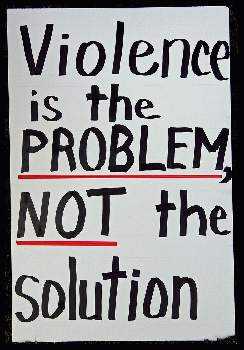From Wagingnonviolence
As we approach the 20th anniversary of 9/11, U.S. citizens must insist on paying reparations and choose to lay aside the cruel futility of our forever wars.
On the morning of Sept. 11, 2001, I was among a small group of U.S. citizens who sat on milk crates or stood holding signs across from the U.S. Mission to the United Nations in Manhattan. We had been fasting from solid foods for a month, calling for an end to brutal economic warfare waged against Iraq through the imposition of U.N. sanctions. Each Friday of our fast, we approached the entrance to the U.S. Mission to the United Nations carrying lentils and rice, asking the U.S. officials to break our fast with us, asking them to hear our reports, gathered after visiting destitute Iraqi hospitals and homes. On four successive Friday afternoons, New York police handcuffed us and took us to jail.
Two days after the passenger planes attacked the World Trade Center, U.S. Mission to the U.N. officials called us and asked that we visit with them.
I had naively hoped this overture could signify empathy on the part of U.S. officials. Perhaps the 9/11 attack would engender sorrow over the suffering and pain endured by people of Iraq and other lands when the U.S. attacks them. The officials at the U.S. Mission to the United Nations wanted to know why we went to Iraq but we sensed they were mainly interested in filling out forms to comply with an order to gather more information about U.S. people going to Iraq.
The U.S. government and military exploited the grief and shock following the 9/11 attacks to raise fears, promote Islamophobia and launch forever wars which continue to this day. Under the guise of "counter-terrorism," the United States now pledges to combine drone attacks, surveillance, airstrikes and covert operations to continue waging war in Afghanistan. Terror among Afghans persists.
I last visited Kabul, Afghanistan in September 2019. While there, a young friend I've known for five years greeted me and then spoke in a hushed voice. "Kathy," he asked, "do you know about Qazi Qadir, Bahadir, Jehanzeb and Saboor?" I nodded. I had read a news account shortly before I arrived about Afghan Special Operations commandos, trained by the CIA, having waged a night raid in the city of Jalalabad at the home of four brothers. They awakened the young men, then shot and killed them. Neighbors said the young men had gathered to welcome their father back from the Hajj in Mecca; numerous colleagues insisted the young men were innocent.
My young friend has been deeply troubled by many other incidents in which the United States directly attacked innocent people or trained Afghan units to do so. Two decades of U.S. combat in Afghanistan have made civilians vulnerable to drone attacks, night raids, airstrikes and arrests. Over 4 million people have become internally displaced as they fled from battles or could no longer survive on scarred, drought stricken lands.
In an earlier visit to Kabul, at the height of the U.S. troop surge, another young friend earnestly asked me to tell parents in the United States not to send their sons and daughters to Afghanistan. "Here it is very dangerous for them," he said. "And they do not really help us."
For many years, the United States claimed its mission in Afghanistan improved the lives of Afghan women and children. But essentially, the U.S. war improved the livelihoods of those who designed, manufactured, sold and used weaponry to kill Afghans.
When the United States was winding down its troop surge in 2014 -- but not its occupation -- military officials undertook what they called "the largest retrograde mission in U.S. military history," incurring enormous expenses. One estimate suggested the war in Afghanistan, that year, was costing $2 million per U.S. soldier. That same year, UNICEF officials calculated that the cost of adding iodized salt into the diet of an Afghan infant -- helping to prevent chronic brain damage in children suffering from acute malnourishment -- would be 5 cents per child per year.
Which endeavor would the majority of U.S. people have opted to support, in their personal budgets, had they ever been given a choice? Profligate U.S. military spending in Afghanistan or vital assistance for a starving Afghan child?
(Note: You can view every article as one long page if you sign up as an Advocate Member, or higher).






